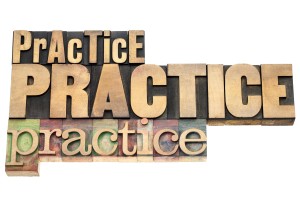English speaking skills: Become a memory champion
English speaking skills: Become a memory champion
You’ve heard this great advice for doing an excellent presentation: Memorize the first several minutes and the last several minutes.
How to do that, you ask? Under the pressure of the need to perform, you just know your mind will go blank.
What to do? The answer– become your own memory champion.
Here’s what the experts say:
Memorize often. Challenging yourself with memory tasks is good for your brain. Start small. Perhaps memorize three vocabulary words or names per day for a week. “By the end of the week you’ll know 21 names, “ says Dr. Majid Fortuhi, a neurologist and leading authority on brain and memory issues. “That’s like doing 10 pushups one day, 20 pushups the next day, then 30. You’re stretching your memory muscles and making them stronger.”
A speech tip from me: Consider spending 5 to 10 minutes a day, five or six days a week memorizing something of interest to you. For years I have done that during my aerobic exercise of treadmill or stationary bike in my home. I will memorize lists, for example the 20 ways to persuade people to your way of thinking. I will memorize clever and wise quotations. For instance here’s my current favorite wise saying that I am memorizing: “You have not lived a perfect day… unless you have done something for someone who will never be able to repay you.” –Ruth Smeltzer
Eat right You may believe that fat and cholesterol are bad for your health. The fact is, they are essential for brain health. “Your brain is 60 to 70 percent fat, and 25 percent of the cholesterol in your body is in the brain, “says Dr. David Perlmutter, a Naples, FL neurologist. He recommends a diet low in carbohydrates and rich in healthy fats like omega-3 fatty acids, particulary DHA (docashexaenoic acid). DHA is found in fish (salmon, sardines, shrimp).
Exercise regularly. Your brain thrives on regular aerobic exercise. Perlmutter says, “Those who exercise actually grow back brain structure – new brain cells in the hippocampus,” cells essential for laying down new memories. He recommends 20 minutes of aerobic exercise five or six times a week.
Click here: www.cleartalkmastery.com/scheduler to sign up for a Free Sample Lesson with us!
Be sure to watch our English Speech Tips videos and Accent Reduction Tip videos for more English pronunciation and accent reduction exercise.
English Speaking Skills: Overlearning–You’ll Love the Results
English Speaking Skills: Overlearning–You’ll Love the Results

You’ve heard it: It takes 1000 times of doing a pattern to make a mental trace. And it takes 10,000 times of doing a pattern to make a habit.
“Why do I have to keep practicing? I already have the skill?”
Such is the protest from all of us – child and adult. Cognitive science has a persuasive response: we don’t just need to learn a skill in order to perform it well, but we need to overlearn it. Decades of research have shown that superior performance requires practice beyond the point of mastery. Mastery– perfect performance of a piano concerto or a tennis serve is the marker that the crucial part of the learning is just getting started.
Here’s some clever research. In the Journal of Neuroscience, researcher Ala Ahmed and colleagues in the integrative physiology department at the University of Colorado, Boulder asked study subjects to move a cursor to manipulate a robotic arm. The researchers measured energy expenditure by analyzing how much oxygen the subjects inhaled and how much carbon dioxide they breathed out. At first, they used up a lot of metabolic power. But by the end of the learning process, the effort they used had declined about 20 percent from when they started.
Whenever we learn to make a new movement, Ahmed, explained, we create and then modify an internal model, a “sensorimotor map” which our nervous system uses to predict muscle movements and the resistance they will encounter. As that internal model is refined over time, we can cut down on unnecessary movement and eliminate wasted energy.
Based on the results of the experiments, the researchers theorize that even after participants had fine-tuned their muscle movements, the neural processes controlling the movement continued to grow more efficient. The brain uses up energy and through overlearning it can get by on less. These gains in mental efficiency free up resources for other tasks: you can play music with greater emotion and passion, or keep track of your opponent’s moves on the other side of the tennis court–or with speech, you can do more complex thinking, more voice inflection, and have greater awareness of your communication partner’s responses.
Other studies have demonstrated that for a wide range of academic and professional activities, overlearning reduces the amount of mental effort required, leading to better performance – especially in high-stress situations. For example, research on the “audience effect” shows that once we’ve overlearned a complex task, we perform it better when other people are watching. But when we haven’t achieved the reduction of mental effort that comes with overlearning, the additional stress of an audience makes errors more likely.
The take home message for any skill you are mastering: take every opportunity to practice. You will get better and better and be able to expand outward and combine several skills in a rainbow fashion.
The take home message for clear English speech communication: take every opportunity to practice speaking clear English – both homework-type practice and practice in daily life. You will get better and better. And you will be able to enhance your skill and come off as a great communicator in one-on-one conversations and in presentations. Watch yourself soar like a free eagle in those communication occasions!
Click here: www.cleartalkmastery.com/scheduler to sign up for a Free Sample Lesson with us!
Be sure to watch our English Speech Tips videos and Accent Reduction Tip videos for more English pronunciation and accent reduction exercise.
English Speaking Training: The Fragile Nature of Intelligence
English Speaking Training: The Fragile Nature of Intelligence
I’ve felt it. You have probably felt it, too. You feel especially smart and funny when talking to one person and then feel unintelligent and unable to speak fluently with another.
It’s not your imagination. Experiments show that when people report feeling comfortable with a conversational partner, they are rated by those partners and observers as indeed being more witty.
This is as example of the powerful effect that social factors can have on thinking , acting, and performing skills.
Psychologists Joshua Aronson and Claude Steele identified the phenomenon of “stereotype threat.” Members of groups believed to be academically inferior – female students in math and science classes, or African-American and Latino students enrolled in college – score much lower on tests when reminded beforehand of their gender or race.
Steele and Aronson’s experiments in the 1990s and dozens of other studies concluded that the performance of students suffered because they were worried about confirming negative stereotypes about their group.
Minorities aren’t the only ones vulnerable to stereotype threat. A group of people confident about their mathematical skills – white male math and engineering majors who obtained high scores on the SAT math portion – did worse on a math test when told the experiment was intended to discover “why Asians appear to outperform other students on tests of math ability.”
The take home lesson: we should all foster techniques for reducing anxiety and building self-confidence. We should focus on making our social environments full of warmth and trust, not competition and exclusion. We should nurture the self confidence in others to be the best version of themselves… and they will be.
Next time: How overlearning makes you not just a star but a brilliant star
Click here: www.cleartalkmastery.com/scheduler to sign up for a Free Sample Lesson with us!
Be sure to watch our English Speech Tips videos and Accent Reduction Tip videos for more English pronunciation and accent reduction exercise.











